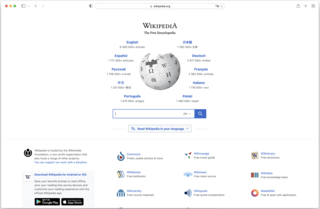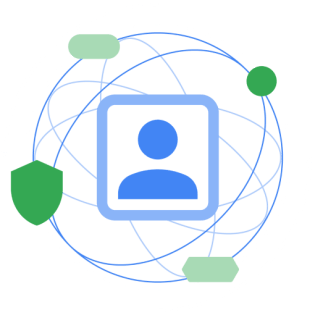Related Research Articles

A web browser is application software for accessing websites. When a user requests a web page from a particular website, the browser retrieves its files from a web server and then displays the page on the user's screen. Browsers are used on a range of devices, including desktops, laptops, tablets, and smartphones. In 2020, an estimated 4.9 billion people used a browser. The most used browser is Google Chrome, with a 65% global market share on all devices, followed by Safari with 18%.
WebKit is a browser engine developed by Apple and primarily used in its Safari web browser, as well as on the iOS and iPadOS version of any web browser. WebKit is also used by the BlackBerry Browser, PlayStation consoles beginning from the PS3, the Tizen mobile operating systems, a browser included with the Amazon Kindle e-book reader, and on Nintendo consoles beginning from the 3DS Internet Browser and onward. WebKit's C++ application programming interface (API) provides a set of classes to display Web content in windows, and implements browser features such as following links when clicked by the user, managing a back-forward list, and managing a history of pages recently visited.
Netscape Plugin Application Programming Interface (NPAPI) was an application programming interface (API) of the web browsers that allows plugins to be integrated.
A browser extension is a small software module for customizing a web browser. Browsers typically allow a variety of extensions, including user interface modifications, cookie management, ad blocking, and the custom scripting and styling of web pages.
Google Browser Sync was a Mozilla Firefox extension released as freeware from Google. It debuted in Google Labs on 8 June 2006, and in June 2008 was discontinued. It allowed users of Mozilla Firefox up to versions 2.x to synchronize their web browser settings across multiple computers via the Internet.
Google Chrome is a cross-platform web browser developed by Google. It was first released in 2008 for Microsoft Windows, built with free software components from Apple WebKit and Mozilla Firefox. Versions were later released for Linux, macOS, iOS, and also for Android, where it is the default browser. The browser is also the main component of ChromeOS, where it serves as the platform for web applications.
Google Native Client (NaCl) was a sandboxing technology for running either a subset of Intel x86, ARM, or MIPS native code, or a portable executable, in a sandbox. It allows safely running native code from a web browser, independent of the user operating system, allowing web apps to run at near-native speeds, which aligns with Google's plans for ChromeOS. It may also be used for securing browser plugins, and parts of other applications or full applications such as ZeroVM.

Chromium is a free and open-source web browser project, mainly developed and maintained by Google. This codebase provides the vast majority of code for the Google Chrome browser, which is proprietary software and has some additional features.

ChromeOS, sometimes stylized as chromeOS and formerly styled as Chrome OS, is a Linux-based operating system designed by Google. It is derived from the open-source ChromiumOS and uses the Google Chrome web browser as its principal user interface.
Web SQL Database is a deprecated web browser API specification for storing data in databases that can be queried using SQL variant.
HTML5 Audio is a subject of the HTML5 specification, incorporating audio input, playback, and synthesis, as well as speech to text, in the browser.
Blink is a browser engine developed as part of the Chromium project with contributions from Google, Meta, Microsoft, Opera Software, Adobe, Intel, IBM, Samsung, and others. It was first announced in April 2013.
Google Chrome is a freeware web browser developed by Google LLC. The development process is split into different "release channels", each working on a build in a separate stage of development. Chrome provides four channels: Stable, Beta, Dev, and Canary. Chrome is updated every two to three weeks on the stable builds for minor releases and every four weeks for major releases.
ANGLE is an open source, cross-platform graphics engine abstraction layer developed by Google. ANGLE translates OpenGL ES 2/3 calls to DirectX 9, 11, OpenGL or Vulkan API calls. It's a portable version of OpenGL but with limitations of OpenGL ES standard.

Google Sheets is a spreadsheet program included as part of the free, web-based Google Docs Editors suite offered by Google. The service also includes: Google Docs, Google Slides, Google Drawings, Google Forms, Google Sites and Google Keep. Google Sheets is available as a web application, mobile app for: Android, iOS, Microsoft Windows, BlackBerry OS and as a desktop application on Google's ChromeOS. The app is compatible with Microsoft Excel file formats. The app allows users to create and edit files online while collaborating with other users in real-time. Edits are tracked by a user with a revision history presenting changes. An editor's position is highlighted with an editor-specific color and cursor and a permissions system regulates what users can do. Updates have introduced features using machine learning, including "Explore", offering answers based on natural language questions in a spreadsheet.

Microsoft Edge is a proprietary, cross-platform web browser created by Microsoft. It was first released in 2015 as part of Windows 10 and Xbox One and later ported to other platforms as a fork of Google's Chromium open-source project: Android and iOS, macOS, older Windows versions, and most recently Linux. It was created as the successor to Internet Explorer (IE).

Vivaldi ( ) is a freeware, cross-platform web browser developed by Vivaldi Technologies, a company founded by Tatsuki Tomita and Jon Stephenson von Tetzchner, who was the co-founder and CEO of Opera Software. Vivaldi was officially launched on April 6, 2016.
Federated Learning of Cohorts (FLoC) is a type of web tracking. It groups people into "cohorts" based on their browsing history for the purpose of interest-based advertising. FLoC was being developed as a part of Google's Privacy Sandbox initiative, which includes several other advertising-related technologies with bird-themed names. Despite "federated learning" in the name, FLoC does not utilize any federated learning.

The Privacy Sandbox is an initiative led by Google to create web standards for websites to access user information without compromising privacy. Its core purpose is to facilitate online advertising without the use of third-party cookies. The initiative includes Federated Learning of Cohorts as well as other proposed technologies, many of which have bird-themed names. It was announced in August 2019.
References
- ↑ "Chromium sync Google API removed". 24 January 2021. Retrieved 20 March 2021.
- ↑ "Chromium Blog: Limiting Private API availability in Chromium" . Retrieved 23 March 2021.
- ↑ Google Chrome sync
- ↑ Microsoft Edge sync
- ↑ Firefox sync
- ↑ Opera sync